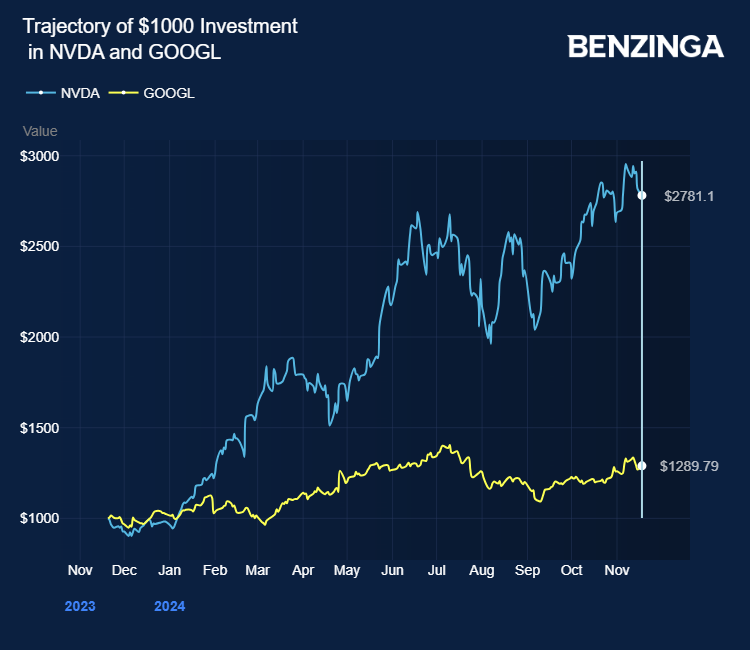Zinger Key Points
- Nvidia teams up with Google Quantum AI to revolutionize quantum computing using CUDA-Q and Eos supercomputing power.
- The partnership enables faster quantum simulations, cutting week-long processes to minutes, advancing quantum hardware innovation.
- Markets are swinging wildly, but for Matt Maley, it's just another opportunity to trade. His clear, simple trade alerts have helped members lock in gains as high as 100% and 450%. Now, you can get his next trade signal—completely free.
On Monday, Nvidia Corp NVDA announced it partnered with Alphabet Inc GOOG GOOGL Google Quantum AI to accelerate the development of next-generation quantum computing devices.
Using Nvidia’s CUDA-Q platform and the Eos supercomputer, Google is advancing simulations to refine its quantum processor designs, addressing challenges like noise that limit current quantum hardware capabilities.
Google Quantum AI is leveraging hybrid quantum-classical computing and Nvidia’s advanced technology to perform comprehensive simulations that analyze noise and qubit interactions.
Also Read: Mastercard Lowers Financial Forecast, Signals Slower EPS, Revenue Growth Ahead

These simulations are essential for scaling quantum hardware while maintaining accuracy.
Guifre Vidal, the research scientist at Google Quantum AI, highlighted the importance of reducing noise for commercial quantum computing to succeed.
Nvidia’s accelerated computing allows Google to explore noise implications for larger quantum chip designs, enabling simulations that were previously too computationally intensive.
By harnessing the CUDA-Q platform and 1,024 Nvidia H100 Tensor Core GPUs on the Eos supercomputer, Google achieved one of the most extensive dynamical simulations of quantum devices to date.
These simulations, which previously required a week, can now be completed in minutes. The ability to simulate devices containing up to 40 qubits marks a significant milestone in quantum hardware development.
The CUDA-Q platform’s software will be publicly available, enabling engineers worldwide to scale and refine their quantum hardware designs. This democratizes access to high-fidelity simulations, paving the way for advancements in quantum computing across industries.
Tim Costa, Nvidia’s director of quantum and HPC, emphasized that AI-driven supercomputing is pivotal to the success of quantum computing. By reducing the cost and time of simulations, this collaboration between Nvidia and Google Quantum AI will likely help solve complex real-world challenges, fostering innovation in fields ranging from cryptography to advanced AI applications.
Nvidia faces increased scrutiny as it approaches its earnings report, with concerns arising over technical issues in its latest AI chips and broader market conditions.
Mizuho analyst Jordan Klein, a long-time supporter of Nvidia, highlighted potential risks for the company’s shares, citing reports of overheating in its new Blackwell systems.
Klein said the swift and often reactionary nature of market dynamics, which could lead to sell-offs before investors thoroughly assess the situation.
Reports suggest that Nvidia’s Blackwell chips, launched in March with claims of delivering 30 times faster performance than prior models, have faced thermal challenges in densely packed server racks. High-profile clients such as Meta Platforms Inc META, Microsoft Corp MSFT, and Alphabet could be impacted.
While Klein remains optimistic about Nvidia’s long-term prospects, he advises caution in the near term, particularly for retail and momentum investors who might react sharply to headlines.
Offering a different perspective, CNBC’s Jim Cramer downplayed the concerns, calling for skepticism about the reported negatives. Cramer suggested that the situation could present a buying opportunity, dismissing specific reports as potentially overstated.
Price Actions: NVDA stock is up 2.47% at $143.62 at the last check on Tuesday.
Also Read:
Image via Shutterstock
Edge Rankings
Price Trend
This content was partially produced with the help of AI tools and was reviewed and published by Benzinga editors.
Market News and Data brought to you by Benzinga APIs© 2025 Benzinga.com. Benzinga does not provide investment advice. All rights reserved.
Trade confidently with insights and alerts from analyst ratings, free reports and breaking news that affects the stocks you care about.